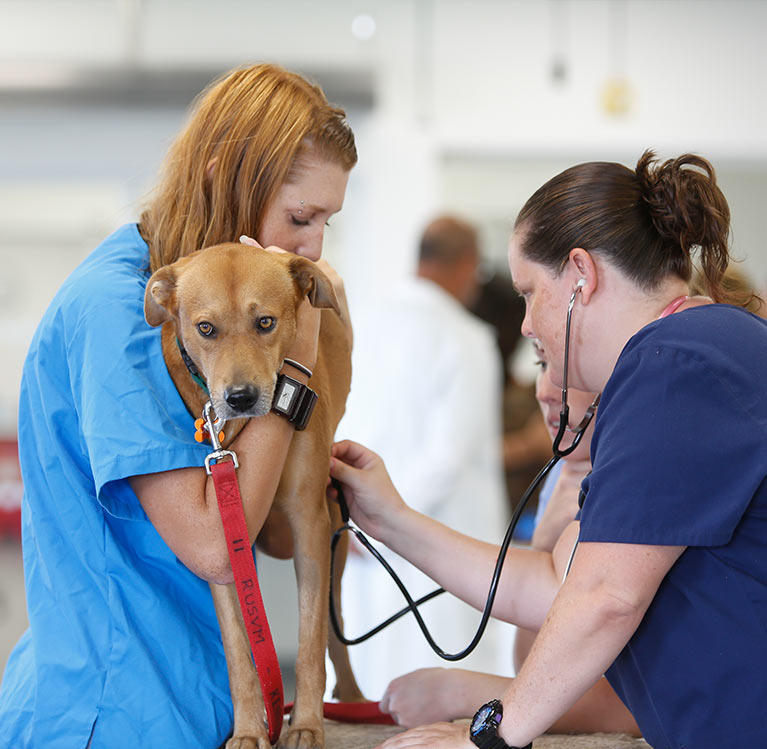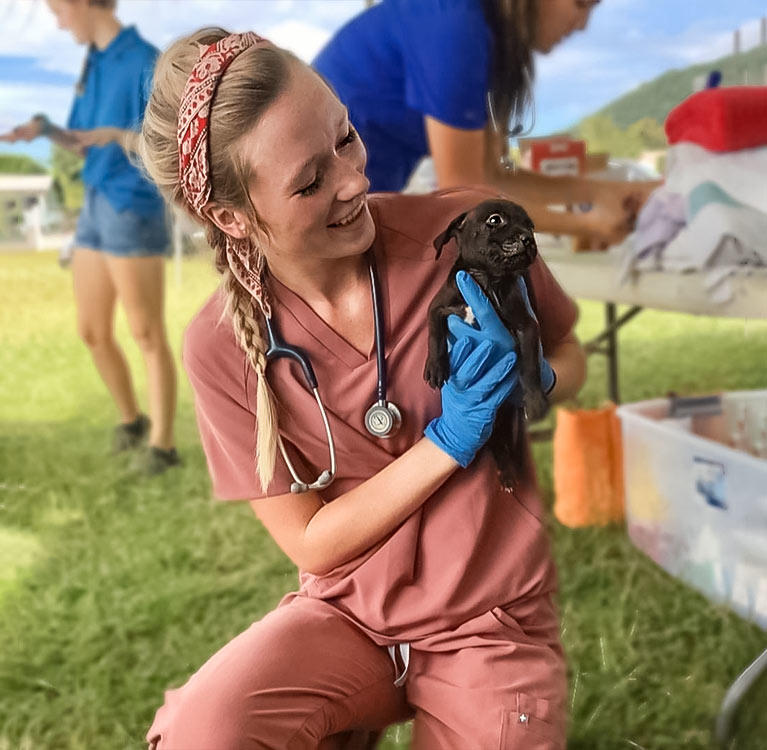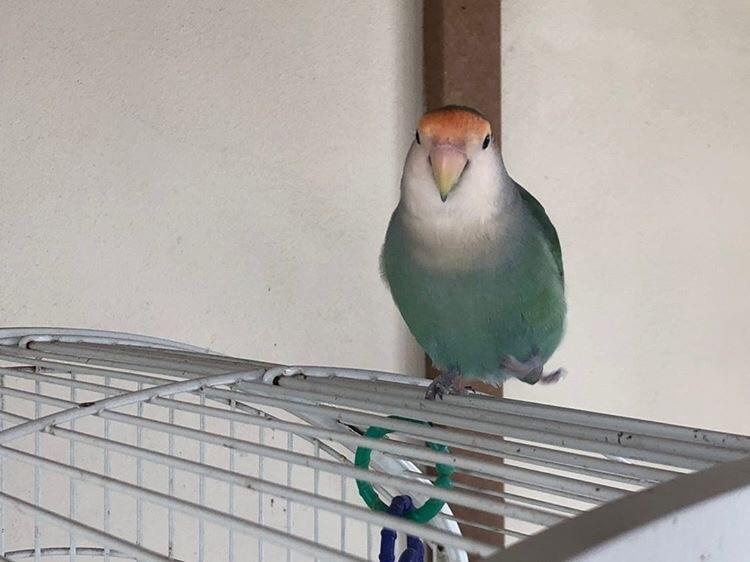If you’re a pet lover, you may know to take your beloved animal to the vet. But how much do you know about veterinary doctors? You might be surprised to learn some don’t even work directly with animals.
Career opportunities in the veterinary field can span across industries. So, just what is a veterinarian? Keep reading to learn more about this expansive, varied field of work.
WHAT IS A VETERINARIAN?
Many are curious to know exactly what is a vet? How do you define a veterinarian? A Doctor of Veterinary Medicine is a medical professional whose primary responsibility is protecting the health and welfare of animals and people. A veterinarian diagnoses and controls animal diseases, treat sick and injured animals, prevents the transmission of animal diseases ("zoonoses") to people, and advise owners on proper care of pets and livestock. They ensure a safe food supply by maintaining the health of food animals. A vet may also be involved in wildlife preservation and conservation and the public health of the human population.
As of 2022, there are 124,069 veterinarians in the United States. Vets provide a wide variety of services in private clinical practice, teaching, research, government service, public health, military service, private industry and other areas. According to the 2022 American Veterinary Medical Association (AMVA) survey, more than 63 percent of veterinarians are in clinical practice. Of those, about 67 percent are engaged in companion animal practice. These veterinarians work with animals, including exotics, owned for companionship, but that just scratches the surface of what these medical professionals do.
Common duties include diagnosing conditions, administering vaccines, prescribing medication, and educating people who own pets. Working with pet owners is one of the most important parts of the job for many practitioners. Veterinarians provide valuable information on the preventive measures that help keep animals healthy.
The majority of veterinarians go into clinical practice, but some (about 11 percent) pursue public or corporate career opportunities in academia, government, industry or commerce. (It should be noted that more than one-third of AMVA survey respondents did not specify whether they worked in the private, public or corporate sectors, so these percentages don’t tell the entire story.) So, what is the job of a veterinarian if they don’t work in clinical practice?
Research
Research veterinarians are needed in pharmaceutical and private research laboratories, universities and various government agencies. These veterinarians may:
- Oversee housing, feeding, breeding, and general health of animals used in research
- Develop and test vaccines and other biological agents to search for new and improved methods of treating and controlling diseases in both animals and humans
- Conduct basic and applied research to better understand the nature of disease, immunity, and health
Education
Many veterinarians teach in universities and colleges. Veterinarians teach in medical schools, agricultural schools and veterinary schools spreading the knowledge of animal health and disease. They teach students, conduct research and develop continuing education programs among many other things.
Public Health and Regulatory Medicine
All states in the U.S. have veterinarians who advise and help control animal diseases. As public health officials, these veterinarians may inspect milk, poultry and meat products; test livestock for disease, and oversee the transport of animals. Public health veterinarians often investigate foodborne diseases, evaluate water safety, and study the effects of biological and environmental contamination.
Industry and Consultation
Veterinarians work with public and private organizations such as the ASPCA, animal shelters, humane societies and 4-H. They may also be employed as consultants and advise ranches, dairies, poultry farms, and meat processing facilities. Additionally, a vet may provide expertise for animal-related products.
WHAT DOES A VETERINARIAN DO ON A TYPICAL DAY?
The typical day for a family or private practice veterinarian includes animal examinations, during which the doctor may check for symptoms, injuries or illness and note such vital signs as temperature, pulse and respiration. Vets may also diagnose and treat issues through blood work, X-rays, ultrasounds, medications, surgery, and osteopathic or physical treatment and therapy. They also regularly administer vaccines and provide guidance to pet owners on animal behavior, dental care, exercise, grooming and nutrition.
Like some doctors, veterinarians also have a lot of clerical work. They must keep detailed records of each animal’s health history, including medications and treatments, and handle such administrative tasks as managing appointments, communicating with other veterinary professionals, ordering supplies and maintaining the practice or workspace. Vets also need to keep current with new and emerging treatments or theories, and always be striving to learn more and improve their practice.
WHERE DO VETS WORK?
Some vets work in private practices or pet clinics that focus on cats, dogs or other small animals. Others work in larger or mobile practices that examine horses, livestock and other animals. While some vets work in animal hospitals, which offer more advanced medical services and 24-hour care for critically ill or injured animals.
Other vets work in zoos and wildlife parks, or in research facilities that study new treatments and drugs. Government agencies employ many veterinarians to enforce animal health and food safety regulations or help create those regulations. Still other vets work in educational institutions as teachers, researchers or administrators.
WHAT EDUCATION AND TRAINING IS REQUIRED TO BE A VETERINARIAN?
Every profession requires certain knowledge, skills and abilities to do the job. As a veterinarian, you should possess compassion, communication and decision-making skills, manual dexterity and, of course, a deep understanding of veterinary medicine. Most vets also have a genuine love of animals.
Education Required to be a Veterinarian
To practice veterinary medicine, you will need to earn your DVM degree from an accredited institution such as Ross University School of Veterinary Medicine (Ross Vet). This degree typically takes four years to earn, but at Ross Vet, students can earn a DVM in just three years and three months.
To get into a vet school, students should be graduates of a four-year university and have completed all vet school prerequisites. In some cases, a DVM program may accept applicants without undergraduate degrees. To be eligible for one of these special programs, you must pursue veterinary-related courses during the first two or three years of your undergraduate studies.
Our article on Vet School Requirements to Know covers many of the things you’ll need to become an eligible applicant, including:
- Course prerequisites
- Veterinary professional experience
- Graduate Record Examination (GRE®)
- Letters of recommendation
Training Required to Become a Veterinarian
In veterinary school, you will spend your first few years taking courses on campus. You’ll study such subjects as animal health and disease, gross anatomy, radiology, parasitology and pharmacology. In your final year, you will spend your time in clinical rotations gaining hands-on experience in a variety of settings.
Students must complete a set number of required rotations that may include small and large animal medicine and surgery, radiology and imaging, anesthesiology, dermatology, emergency care, wildlife medicine and cardiology. Students are also expected to complete elective rotations that may steer you toward a particular specialty. After graduation, many veterinarians complete internships or residencies to gain additional training before starting their careers.
Toward the end of your education, you’ll sit for the North American Licensing Exam® (NAVLE®). After passing the exam, you may also need to complete an additional licensing exam depending on where you plan to practice.
After you graduate from veterinary school and become licensed, you can begin practicing veterinary medicine.
If a career in veterinary medicine appeals to you, check out the Ross Vet DVM program or contact us for more information.
Frequently Asked Questions
Is a veterinarian a real doctor?
Veterinarians are doctors—of veterinary medicine. They must be experts in the biological and physical sciences, but their training necessarily focuses on animals rather than human beings. Many professional aspects are similar—both medical and vet schools last four years and cover many of the same topics, and both MDs and DVMs must be licensed to practice—but the studies of animal and human health are intrinsically different.
What is the definition of a veterinarian?
At its most basic, a veterinarian is a person qualified and authorized to practice veterinary medicine. To be qualified, a vet must be a graduate of an accredited veterinary school such as Ross Vet. To be authorized, a vet must be licensed to practice veterinary medicine in their state, province or jurisdiction. Expanding on that a little, veterinarians care for the health of animals and work to protect public health as well.








